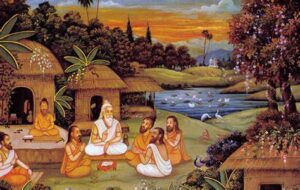
Table of Contents
The Introduction of Vedic Philosophy
Welcome, curious souls, to a profound journey of self-discovery, where we embark on an expedition to unravel the enigmatic realm of Vedic Philosophy. In this mesmerizing odyssey, we shall delve into the depths of India’s ancient wisdom, unlocking life’s greatest mysteries and finding the keys to enlightenment. 🚀📜🌌
1. The Essence of Vedic Philosophy 🕉️
Vedic Philosophy, also known as “Vedanta,” encompasses the spiritual heritage of India, rooted in the sacred texts called the Vedas. It is a timeless treasure trove of wisdom that explores the nature of existence, consciousness, and the cosmic connection between all living beings. 📚🌿🌟
2. Unearthing the Vedic Scriptures 📖🔍
To begin our quest, we must explore the sacred scriptures that form the foundation of Vedic Philosophy. The Vedas, comprising Rigveda, Samaveda, Yajurveda, and Atharvaveda, are ancient texts that offer insights into rituals, hymns, and profound philosophical teachings. 📚🌌🌟
3. The Cosmic Dance: Understanding Brahman and Atman 🌌🕊️
At the heart of Vedic Philosophy lies the concept of Brahman and Atman. Brahman, the ultimate reality and universal consciousness, represents the interconnectedness of all things. Atman, on the other hand, refers to the individual soul or self, which is inherently divine and eternal. The union of Brahman and Atman forms the cosmic dance of existence. 💫🕊️🌠
4. The Eternal Law of Karma ⚖️🔄
In the vast expanse of Vedic Philosophy, the principle of karma holds immense significance. The law of karma dictates that every action has a consequence, creating a cycle of cause and effect. Understanding karma empowers us to make conscious choices and take responsibility for our destinies. 🔄⚖️🕊️
5. Dharma: The Guiding Light 🌟🚦
Central to Vedic Philosophy is the concept of dharma, which encompasses righteousness, duty, and moral law. Living in harmony with dharma aligns us with the cosmic order and leads us on a path of righteousness and spiritual growth. 🚀🕊️🌌
6. Yoga: Union with the Divine 🧘♂️🌄
Vedic Philosophy introduced the practice of yoga, a holistic system that unites the body, mind, and soul. Through various yogic paths such as Hatha, Bhakti, Jnana, and Karma Yoga, we find a way to achieve union with the divine and attain inner peace and enlightenment. 🌌🌿🕉️
Vedic Philosophy unveils the concept of Samsara, the cycle of birth, death, and rebirth. Reincarnation allows the soul to learn and evolve through multiple lifetimes until it attains moksha, liberation from the cycle of birth and death. 🔄🌀💫
8. Meditation: The Gateway to Inner Stillness 🧘🌅
Within the rich tapestry of Vedic Philosophy, meditation plays a vital role in quieting the mind, achieving self-awareness, and transcending worldly attachments. Through meditation, one can experience profound insights and connect with the deeper layers of consciousness. 🧭💭🌄
9. Ahimsa: Embracing Non-Violence 🕊️✌️
Ahimsa, the principle of non-violence, is an essential pillar of Vedic Philosophy. It calls for compassion and respect towards all living beings, fostering a harmonious and compassionate world. By practicing ahimsa, we contribute to the well-being of the entire universe. 🕊️🌿✨
10. The Guru-Shishya Tradition: Passing Down Wisdom 📚👥
In the sacred tradition of Vedic Philosophy, the Guru-Shishya relationship holds immense significance. The Guru, a spiritual guide, imparts wisdom and knowledge to the Shishya (disciple), passing down the teachings through generations. This tradition ensures the preservation of ancient wisdom. 📚👥💡
11. Chakras: Energy Centers of the Body 🌈🌀
The Vedic tradition recognizes the existence of chakras, the energy centers within the body. By aligning and activating these chakras, one can attain balance and harmony, leading to physical, mental, and spiritual well-being. 🧘♀️🌌🌀
12. Festivals and Rituals: Celebrating Cosmic Cycles 🎉🌞
Vedic Philosophy enriches life with vibrant festivals and rituals that celebrate the cosmic cycles and honor deities. From Diwali, the festival of lights, to Navaratri, the nine nights of worship, these celebrations connect us with the divine and the natural rhythms of the universe. 🌌🎊🕯️
13. Wisdom in Everyday Life 🌿💡
Vedic Philosophy transcends mere theory; it offers practical wisdom for navigating the complexities of daily life. By integrating its principles into our routines, we can find profound joy, purpose, and fulfillment in the simplest of actions. 🌞💫🧘♂️
14. Vedic Philosophy in Modern Times 🚀🌐
As we traverse the modern landscape, the relevance of Vedic Philosophy remains undeniable. Its timeless teachings provide solace, clarity, and hope amidst the chaos of the modern world. Embracing Vedic principles, we can pave the way for a harmonious and enlightened society. 🌐🌿🌟
Conclusion:
Our expedition into the depths of Vedic Philosophy has led us to a place of profound insight and wisdom. Through the ages, this ancient treasure trove has offered guidance, solace, and hope to those who seek to unlock the secrets of life and the universe. Let us carry these timeless teachings in our hearts, embracing the oneness that connects us all. 🌌🕊️🌟
As the sun sets on our journey, may the light of Vedic Philosophy continue to illuminate our paths, guiding us towards a life of purpose, love, and cosmic connection. 🌅🌠💫
“Om Asato Ma Sadgamaya, Tamaso Ma Jyotirgamaya, Mrityor Ma Amritamgamaya”
Lead us from untruth to truth, from darkness to light, from mortality to immortality.
Question and Answer:
FAQ 1: What is Vedic Philosophy? 🕉️ 👉
Vedic Philosophy is the ancient spiritual heritage of India, encompassing profound insights into metaphysics, ethics, and spirituality.
FAQ 2: How many sacred texts are in the Vedas? 📜
👉 The Vedas consist of four sacred texts: Rigveda, Yajurveda, Samaveda, and Atharvaveda.
FAQ 3: What is the cosmic connection between Brahman and Atman? 🌌🕊️
👉 Brahman represents universal consciousness, while Atman signifies the individual soul seeking union with the cosmic whole.
FAQ 4: What is the significance of meditation in Vedic Philosophy? 🧭🌌
👉 Meditation is a pathway to self-discovery and inner stillness, connecting us with our divine essence.
FAQ 5: How does Vedic Philosophy influence everyday life? 🌿💡
👉 Vedic wisdom inspires mindfulness, compassion, and living in harmony with the cosmic order, enhancing our daily experiences.
🧭📜






